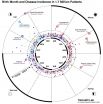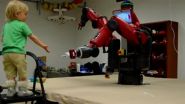INFORMATION:
The research was funded by Academy of Finland Centre of Excellence for Cancer Genetics, Jane and Aatos Erkko Foundation and EU FP7 project SYSCOL.
For more information, please contact:
Academy Professor Lauri Aaltonen
Tel. +358-40-4435041
E-mail: lauri.aaltonen@helsinki.fi END
Novel mutational process targeting gene regulatory elements discovered
Researchers found previously uncharacterized mutational patterns in gastrointestinal tract cancers
2015-06-08
(Press-News.org) Researchers at University of Helsinki, Finland, and Karolinska Institutet, Sweden, discovered previously uncharacterized mutational patterns in the human regulatory genome, especially in gastrointestinal tract cancers. The study was published in Nature Genetics.
The research led by Academy Professor Lauri Aaltonen and Professor Jussi Taipale, was based on study of more than two hundred whole genomes of colorectal cancer samples. The scientists detected a distinct accumulation of mutations specifically at sites where the proteins CTCF and cohesin bind the DNA.
Both CTCF and cohesin are transcription factors carrying out essential functions in the genome, including regulation of gene expression and chromatin structure. In hypermutated tumors, the CTCF/cohesin sites appear to be protected from mutations while in a distinct set of tumors, CTCF/cohesin sites are mutated with frequency higher than previously known protein coding cancer genes. Tumors with high CTCF site mutation load tend to have greater frequency of certain type of mutations distributed throughout their genome. The process producing these mutations is not fully understood and needs further investigation.
Until now the mutational patterns of the regulatory genome are poorly characterized. Unraveling the underlying mechanisms of regulatory mutations in cancer remains a great challenge. The novel findings from this study are significant and an important step towards understanding the cause and consequences of cancer-associated mutations.
"The findings of this study were totally unexpected; they uncover the second face of the cancer genome. However, we have a lot of work to do for understanding about the reasons and consequences of these changes", Professor Aaltonen states.
ELSE PRESS RELEASES FROM THIS DATE:
Injectable electronics
2015-06-08
It's a notion that might be pulled from the pages of science-fiction novel - electronic devices that can be injected directly into the brain, or other body parts, and treat everything from neurodegenerative disorders to paralysis.
It sounds unlikely, until you visit Charles Lieber's lab.
A team of international researchers, led by Lieber, the Mark Hyman, Jr. Professor of Chemistry, an international team of researchers developed a method for fabricating nano-scale electronic scaffolds that can be injected via syringe. Once connected to electronic devices, the scaffolds ...
Schizophrenia and bipolar disorder may share genetic roots with creativity
2015-06-08
Genes linked to creativity could increase the risk of developing schizophrenia and bipolar disorder, according to new research carried out by researchers at the Institute of Psychiatry, Psychology & Neuroscience (IoPPN) at King's College London.
Previous studies have identified a link between creativity and psychiatric disorders such as bipolar disorder, but it has remained unclear whether this association is due to common genes. Published today in Nature Neuroscience, this new study lends support to the direct influence on creativity of genes found in people with schizophrenia ...
Accentuate the positive when it comes to nutrition education
2015-06-08
ITHACA, N.Y. - If you want people to choose healthier foods, emphasize the positive, says a new Cornell University study.
Published in the American Journal of Agricultural Economics, the Cornell Food and Brand Lab study showed that when it comes to nutrition education, dos work a lot better than don'ts. This is especially important when determining policies that encourage healthy eating.
Media note: A short video explaining the research, as well as an informational graphic and additional details about this research can be found at, http://foodpsychology.cornell.edu/OP/Hidden_Costs ...
How your brain is telling you to vote
2015-06-08
This news release is available in French. A new joint study by researchers at the Montreal Neurological Institute and the Centre for the Study of Democratic Citizenship, both at McGill University, has cast some light on the brain mechanisms that support people's voting decisions. Evidence in the study shows that a part of the brain called the lateral orbitofrontal cortex (LOFC) must function properly if voters are to make choices that combine different sources of information about the candidates. The study found that damage to the LOFC leads people to base their vote ...
Study examines psychotropic medication use in children, teens with Down syndrome
2015-06-08
A new study gives insight into the mental health of children and teens with Down syndrome and the behavioral medications that medical caregivers sometimes prescribe for them.
The Cincinnati Children's Hospital Medical Center study shows that teens and young adults between the ages of 12 and 21 were significantly more likely to be on psychotropic medications than children 5 to 11 years old. Among children less than 12, the odds of being on a psychotropic medication increased with age for all classes of medications studied. For 12 to 18 year olds, the odds of being on ...
Data scientists find connections between birth month and health
2015-06-08
NEW YORK, NY (June 8, 2015) - Columbia University scientists have developed a computational method to investigate the relationship between birth month and disease risk. The researchers used this algorithm to examine New York City medical databases and found 55 diseases that correlated with the season of birth. Overall, the study indicated people born in May had the lowest disease risk, and those born in October the highest. The study was published in the Journal of American Medical Informatics Association.
"This data could help scientists uncover new disease risk factors," ...
Using Minecraft to unboggle the robot mind
2015-06-08
PROVIDENCE, R.I. [Brown University] -- Researchers from Brown University are developing a new algorithm to help robots better plan their actions in complex environments. It's designed to help robots be more useful in the real world, but it's being developed with the help of a virtual world -- that of the video game Minecraft.
Basic action planning, while easy for humans, is a frontier of robotics. Part of the problem is that robots don't intuitively ignore objects and actions that are irrelevant to the task at hand. For example, if someone asked you to empty the trashcan ...
Ultrafast heat conduction can manipulate nanoscale magnets
2015-06-08
Researchers at the University of Illinois at Urbana-Champaign have uncovered physical mechanisms allowing the manipulation of magnetic information with heat. These new phenomena rely on the transport of thermal energy, in contrast to the conventional application of magnetic fields, providing a new, and highly desirable way to manipulate magnetization at the nanoscale.
"In our study, we make use of the fact that a heat current passing through a magnetic material creates a separation of electron spins. This process creates a current of magnetic dipoles that we use to manipulate ...
Study links severe restless legs syndrome to increased risk of stroke
2015-06-08
DARIEN, IL - A new study suggests that increased restless legs syndrome (RLS) severity is associated with subsequent increased risk of stroke.
Results show that increased RLS severity is associated with subsequent increased risk of stroke, after considering other known risk factors such as age, smoking, hypertension, and unhealthy diet. There were 161 incident stroke cases during the six-year follow-up.
"We were surprised at the importance of taking into account RLS severity -- it was only severe RLS, not milder RLS, that was associated with increased risk of stroke," ...
Study links lower life satisfaction to sleep problems during midlife
2015-06-08
DARIEN, IL - A new study suggests that lower life satisfaction is linked to sleep problems during midlife.
Respondents with higher life satisfaction reported shorter sleep onset latency (SOL). Sleep onset delay among those with low life satisfaction could be the result of worry and anxiety, as reported elsewhere. These findings support the idea that life satisfaction is interlinked with many measures of sleep and sleep quality, suggesting that improving one of these variables might result in improving the other.
"These findings support the idea that life satisfaction ...
LAST 30 PRESS RELEASES:
New knowledge on heritability paves the way for better treatment of people with chronic inflammatory bowel disease
Under the Lens: Microbiologists Nicola Holden and Gil Domingue weigh in on the raw milk debate
Science reveals why you can’t resist a snack – even when you’re full
Kidney cancer study finds belzutifan plus pembrolizumab post-surgery helps patients at high risk for relapse stay cancer-free longer
Alkali cation effects in electrochemical carbon dioxide reduction
Test platforms for charging wireless cars now fit on a bench
$3 million NIH grant funds national study of Medicare Advantage’s benefit expansion into social supports
Amplified Sciences achieves CAP accreditation for cutting-edge diagnostic lab
Fred Hutch announces 12 recipients of the annual Harold M. Weintraub Graduate Student Award
Native forest litter helps rebuild soil life in post-mining landscapes
Mountain soils in arid regions may emit more greenhouse gas as climate shifts, new study finds
Pairing biochar with other soil amendments could unlock stronger gains in soil health
Why do we get a skip in our step when we’re happy? Thank dopamine
UC Irvine scientists uncover cellular mechanism behind muscle repair
Platform to map living brain noninvasively takes next big step
Stress-testing the Cascadia Subduction Zone reveals variability that could impact how earthquakes spread
We may be underestimating the true carbon cost of northern wildfires
Blood test predicts which bladder cancer patients may safely skip surgery
Kennesaw State's Vijay Anand honored as National Academy of Inventors Senior Member
Recovery from whaling reveals the role of age in Humpback reproduction
Can the canny tick help prevent disease like MS and cancer?
Newcomer children show lower rates of emergency department use for non‑urgent conditions, study finds
Cognitive and neuropsychiatric function in former American football players
From trash to climate tech: rubber gloves find new life as carbon capturers materials
A step towards needed treatments for hantaviruses in new molecular map
Boys are more motivated, while girls are more compassionate?
Study identifies opposing roles for IL6 and IL6R in long-term mortality
AI accurately spots medical disorder from privacy-conscious hand images
Transient Pauli blocking for broadband ultrafast optical switching
Political polarization can spur CO2 emissions, stymie climate action
[Press-News.org] Novel mutational process targeting gene regulatory elements discoveredResearchers found previously uncharacterized mutational patterns in gastrointestinal tract cancers



